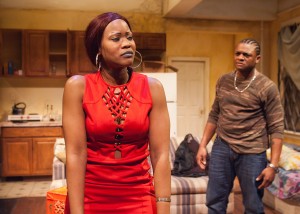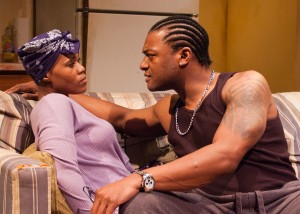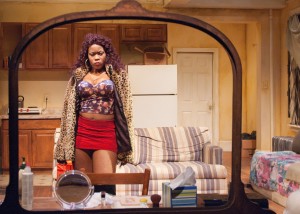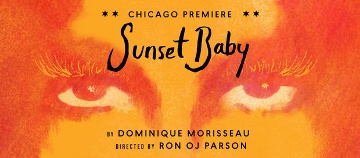LEARNING TO BE LOVED
The past clashes with the future in Dominique Morisseau’s Sunset Baby, a drama more of reckoning than reconciliation. Despite her rage at the father she thinks deserted both her and her late mother in the name of impossible idealism, a daughter is forced to face a legacy of radical activism.  Inevitably, a normal family life got lost in the black power movement that sent Nina’s dad to jail and her mom to drugs. Years later, Nina (named after the singer) is holed up in a grungy apartment on New York’s Lower East Side, nearly empty because the cops confiscated the stuff from the previous place. Nina discovers that the letters that her mom Ashante X, an Oakland icon of the Black Panthers, wrote to her father in prison are worth a lot. But her father Kenyatta wants the valuable correspondence, less for money, than for memory’”and to prove to Nina what they did for love, the sacrifices they made, including a normal childhood with constant parents. For him fatherhood means fear: Eaten with guilt (he was not there to prevent Ashante from dying of an overdose), he still knows that they loved Nina much more than she remembers. She too must feel that bequest, as much as any lessons from an earlier generation’s stabs at revolution.
Inevitably, a normal family life got lost in the black power movement that sent Nina’s dad to jail and her mom to drugs. Years later, Nina (named after the singer) is holed up in a grungy apartment on New York’s Lower East Side, nearly empty because the cops confiscated the stuff from the previous place. Nina discovers that the letters that her mom Ashante X, an Oakland icon of the Black Panthers, wrote to her father in prison are worth a lot. But her father Kenyatta wants the valuable correspondence, less for money, than for memory’”and to prove to Nina what they did for love, the sacrifices they made, including a normal childhood with constant parents. For him fatherhood means fear: Eaten with guilt (he was not there to prevent Ashante from dying of an overdose), he still knows that they loved Nina much more than she remembers. She too must feel that bequest, as much as any lessons from an earlier generation’s stabs at revolution.  It’s up to Nina to discover the true worth of these nearly lost letters and, in the process, her own. Not a theater to dabble in character-driven dramas, whatever their historical resonance, TimeLine Theatre Company completely commits to this fierce domestic one-act. In Ron OJ Parson’s solid staging very little action gets in the way of 110 minutes of raw feeling: AnJi White’s hardened, gun-toting Nina contends with two significant men, each a turning point. There’s Nina’s drug-dealing boyfriend Damon (Kelvin Roston Jr.). Nina admires this thug as a “survivor.” Because his predations create their own alternative economy, Damon considers himself a disruptor, if not old school, then old larceny. Seething with “mad love” and cosmopolitan ambition (they both want to escape to London or Brazil), Damon sees them as Bonnie and Clyde. That criminal fantasy, of course, is the antithesis of Ashante and Kenyatta’s parternership in African-American liberation. But even here the past makes parallels: Damon, estranged from his baby mother, has a 7-year-old son whose neglected childhood won’t be much emptier than was Nina’s.
It’s up to Nina to discover the true worth of these nearly lost letters and, in the process, her own. Not a theater to dabble in character-driven dramas, whatever their historical resonance, TimeLine Theatre Company completely commits to this fierce domestic one-act. In Ron OJ Parson’s solid staging very little action gets in the way of 110 minutes of raw feeling: AnJi White’s hardened, gun-toting Nina contends with two significant men, each a turning point. There’s Nina’s drug-dealing boyfriend Damon (Kelvin Roston Jr.). Nina admires this thug as a “survivor.” Because his predations create their own alternative economy, Damon considers himself a disruptor, if not old school, then old larceny. Seething with “mad love” and cosmopolitan ambition (they both want to escape to London or Brazil), Damon sees them as Bonnie and Clyde. That criminal fantasy, of course, is the antithesis of Ashante and Kenyatta’s parternership in African-American liberation. But even here the past makes parallels: Damon, estranged from his baby mother, has a 7-year-old son whose neglected childhood won’t be much emptier than was Nina’s.  Then there’s dad, a former political prisoner not too humbled by shame to hold out hope. He stands for something more substantial than survival. Declaring his dedication to Nina in the video letters he records throughout the action (his parallel to Ashante’s love letters), Kenyatta (Phillip Edward Van Lear) offers Nina a gift from before, when. as the title says, she was a baby taken to’”and treasured at’”San Francisco’s Sunset Beach. Agonizingly, the daughter’s ferocious and reflexive response is to scorn dad’s cause. Only the ballads of Nina Simone ground her in something more than resentment and recriminations. So who will win Nina’s heart?
Then there’s dad, a former political prisoner not too humbled by shame to hold out hope. He stands for something more substantial than survival. Declaring his dedication to Nina in the video letters he records throughout the action (his parallel to Ashante’s love letters), Kenyatta (Phillip Edward Van Lear) offers Nina a gift from before, when. as the title says, she was a baby taken to’”and treasured at’”San Francisco’s Sunset Beach. Agonizingly, the daughter’s ferocious and reflexive response is to scorn dad’s cause. Only the ballads of Nina Simone ground her in something more than resentment and recriminations. So who will win Nina’s heart?  Though stuck in a static situation reserved for emotion more than action, Sunset Baby pulses with the characters’ raw, often righteous, hunger for happiness. Morisseau’s eloquent script inspires passionate performances from three driven actors, their hard-earned lines from the heart as much as the lungs.
Though stuck in a static situation reserved for emotion more than action, Sunset Baby pulses with the characters’ raw, often righteous, hunger for happiness. Morisseau’s eloquent script inspires passionate performances from three driven actors, their hard-earned lines from the heart as much as the lungs.  photos by Lara Goetsch Sunset Baby TimeLine Theatre Company 615 W. Wellington Ave. ends on April 10, 2016 for tickets, call 773.281.8463 or visit TimeLine for more info on Chicago Theater, visit Theatre in Chicago
photos by Lara Goetsch Sunset Baby TimeLine Theatre Company 615 W. Wellington Ave. ends on April 10, 2016 for tickets, call 773.281.8463 or visit TimeLine for more info on Chicago Theater, visit Theatre in Chicago

